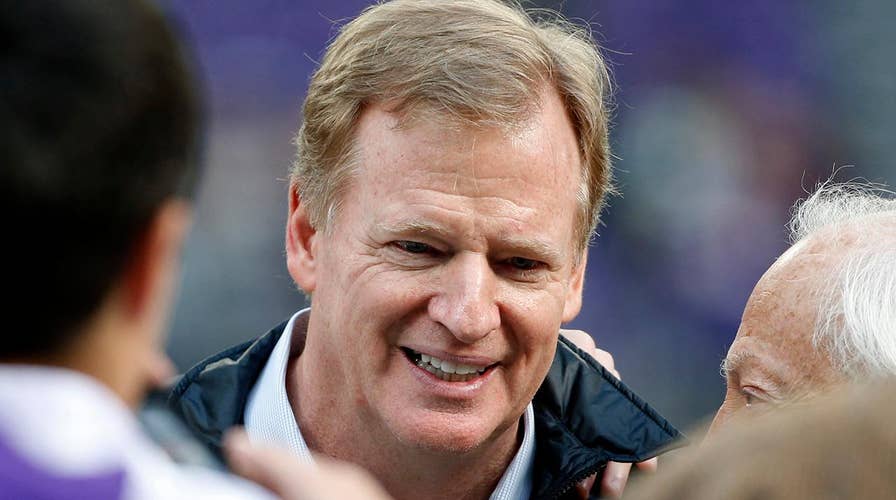NFL owners gather for annual meeting amid anthem controversy
Rick Leventhal reports from New York City on the ongoing debate over the issue.
Football players kneel. Owners support them. President threatens owners with tax consequences. What does the First Amendment say about all this? This is not an easy question, though some of President Trump’s critics seem to think it is.
The ACLU has said it is ready to defend the First Amendment rights of players and to challenge the president’s “unconstitutional efforts to bully the NFL into complying with his view of what is politically correct.” But are President Trump’s efforts “unconstitutional,” or are they constitutionally protected expression?
Some Trump critics allege that the presidential threats constitute state action and chill the First Amendment rights of the kneeling players and their supportive owners. They cite the case of Playboy magazine and the American Booksellers Association against former Attorney General Edwin Meese, who formed a commission on pornography and sent letters threatening to publish a list of convenience stores that sold pornographic materials. Playboy charged that the attorney general was illegally attempting to censor constitutionally protected magazines.
Constraining the president’s freedom of speech might be a slippery slope down which supporters of a vibrant First Amendment should be cautious to go. It could place constraints on the ability of a future president, Republican or Democrat, to use his or her bully pulpit to do good.
In this case, however, the president lacks the authority to revoke tax benefits or impose new tax burdens. He can ask Congress to do that, and those on the other side can ask it not to. If Congress does act, there may then be a strong argument that it has chilled freedom of speech. But absent a change in the law, a mere threat from the president— who himself has free speech rights— should not be enough to warrant judicial intervention in the open marketplace of ideas.
Moreover, constraining the president’s freedom of speech might be a slippery slope down which supporters of a vibrant First Amendment should be cautious to go. It could place constraints on the ability of a future president, Republican or Democrat, to use his or her bully pulpit to do good.
I, for one, always insist that anything I advocate pass the “shoe on the other foot" test. I’m afraid this lawsuit doesn’t meet that standard.
Let’s imagine, for instance, a woman has accused a football player of doing something horrible, a charge he vehemently denies. Let's further hypothesize his fellow players chanting something like “women lie, women lie” before the kickoff, and the owners, in a show of support for their players, stand in solidarity with them.
Enter a liberal feminist president — imagine Hillary Clinton in the Oval Office. She condemns what the players are chanting and threatens tax reprisals against the supportive owners. Remember, this is only a "shoe on the other foot" hypothesis - but would the people who are bringing the First Amendment lawsuit against President Trump be bringing a similar lawsuit against a President Clinton? Would they be stretching law, facts and logic to contrive a distinction between the cases? Or would they simply acknowledge their inconsistency and invoke Emerson on hobgoblins and small minds?

